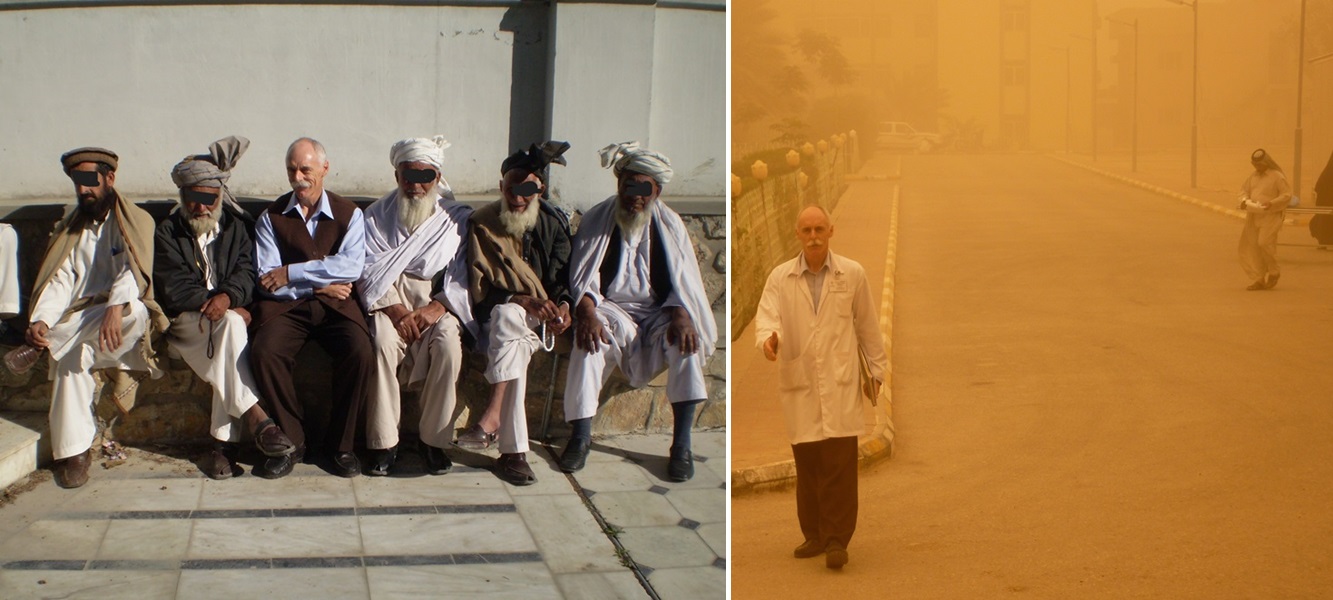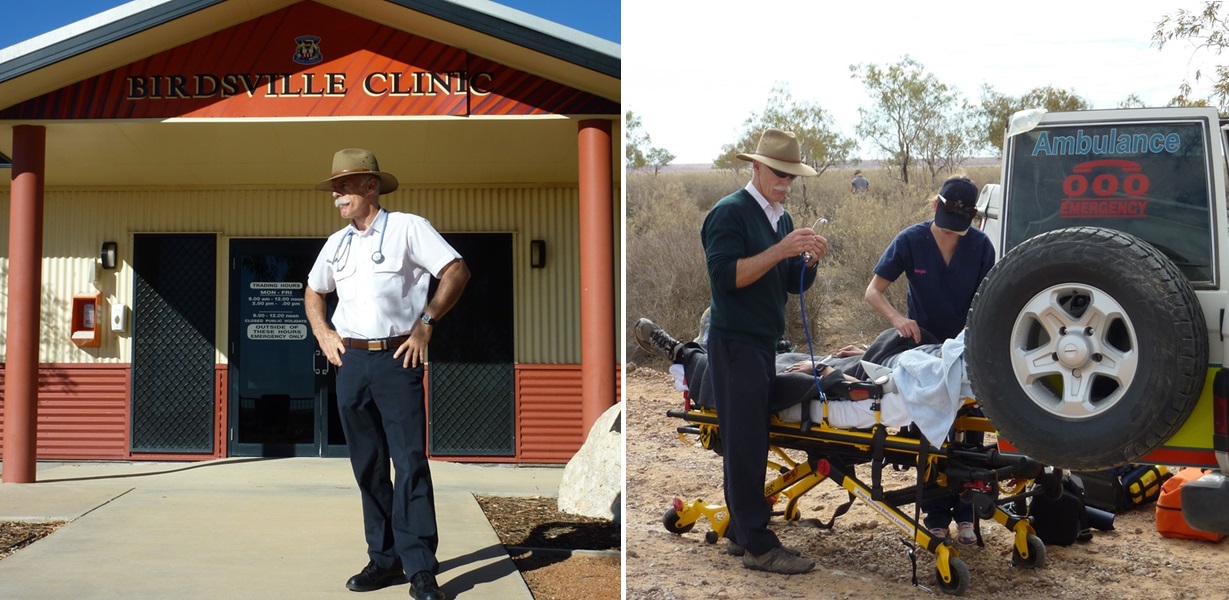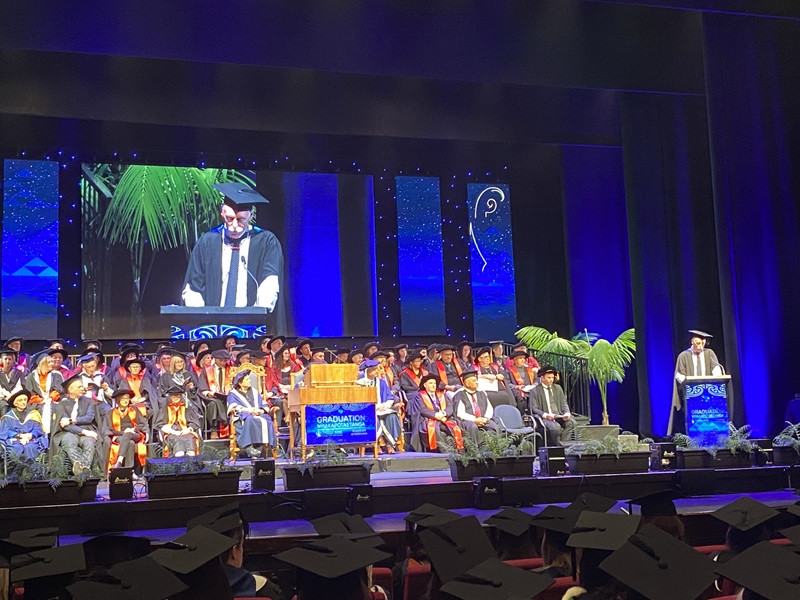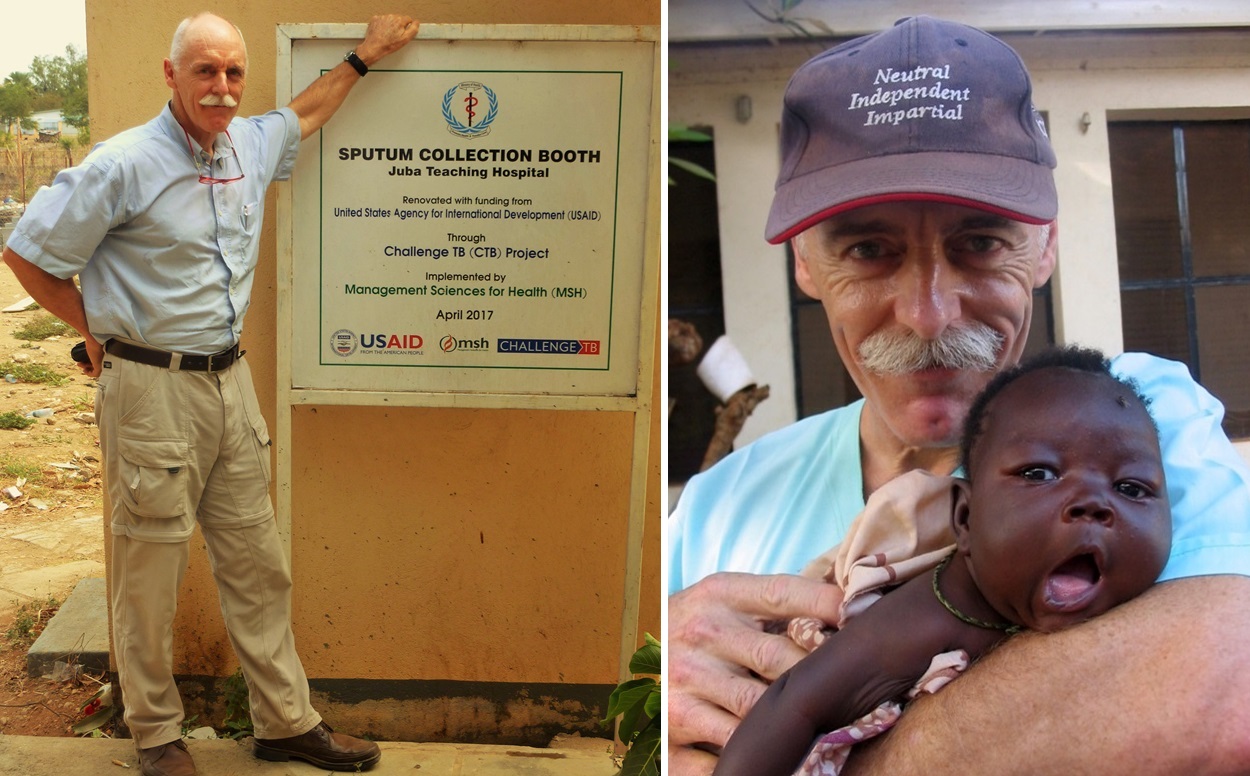From pioneer nurse to global humanitarian: a life of service, compassion, and lifelong learning
When Andrew Cameron left high school, he never imagined a career in nursing. “I was working in market-gardening for a couple of years,” he recalls. “Then I met a male nurse-in-training at Napier Hospital while visiting an injured friend. I thought that such a caring profession might be a possible career for me — a chance to enter an occupation which makes a true difference to the lives and welfare of others. I gave it a go and it just seemed to stick with me. Actually, I think nursing chose me.”
That decision would lead Andrew to a nearly five decades-long career of courage, service, and compassion.
Breaking ground as a pioneer
Andrew began his nurse training in the 1970s, when male nurses were rare, and role models were even rarer. “Being a male nurse in the 1970s meant I was one of very few,” he says. “Being a male midwife in the 1980s was even more rare. I had no one to look up to as a role model, so I had to forge a way ahead as my own kind of pioneer.”
His journey wasn’t always easy, but it was filled with purpose. “I pressed on with my chosen career and did the best I could,” Andrew says. “I’ve met many wonderful people along the way and have kept a record of all the unusual and interesting moments I experienced – I even wrote a book about them.”
Andrew graduated from Massey University with an Advanced Diploma in Nursing in 1984, and later returned to complete a Bachelor of Nursing degree.
Andrew describes Massey as “a great place to study.” “I credit Massey for giving me the foundational skills to take on challenging work. The knowledge in biosciences, evidence-based practice, integrated care, and acute care skills have set me up well to manage this kind of work.” These core skills would prove critical in the most demanding environments – from remote outposts to war zones.
 Left: Andrew with elders at a meeting in Afghanistan. Right: At a hospital in Iraq - the dust from the surrounding deserts blew in very often
Left: Andrew with elders at a meeting in Afghanistan. Right: At a hospital in Iraq - the dust from the surrounding deserts blew in very often
A turning point with the Red Cross
After 15 years of growing his nursing skills, Andrew made a bold shift to humanitarian work. “Yes, it was a turning point,” he reflects. “The Red Cross is a wonderful worldwide organisation based on neutrality, independence and impartiality. I only have great words to say about my deployments, the people I worked with, and the results we accomplished.”
Since 2005, Andrew has worked in crisis zones across the globe with various organisations – including Afghanistan, South Sudan, Yemen, Iraq, Sierra Leone, Georgia, Rwanda, Djibouti, and the Solomon Islands – often in the most extreme circumstances. Most recently, Andrew served in a military trauma ward in eastern Ukraine, providing care for wounded soldiers and civilians amid armed conflict.
“This was an immense privilege. I worked in the triage area for the wounded, the operating theatres – as a scrub nurse or nurse assisting the surgeon – and in the dressing clinics, dealing with traumatically amputated limbs, gun-shot wounds and so on. It was not so easy on an emotional level, but the soldiers seemed to like having me to care for them.
“I had no set hours of duty, so I decided I would work almost every day and put in as many hours as possible. Every bit of help I can provide is deeply appreciated – it feels like a unique privilege to care for the injured in this conflict.”
Finding strength in difficult moments
Andrew has also faced moments of deep challenge in a long service career. “Several of my close colleagues have been killed in the field of duty. This is never an easy situation to deal with,” he shares.
During one deployment in Yemen, he was falsely accused of being a spy. “I was once locked up in a prison for a few days… My interrogator threatened me with execution. This was rather a tough challenge to deal with.”
He credits the Catholic Sisters of Compassion in New Zealand for helping him find peace and strength. “For me, those sisters are a marvellous source of quietude, solace, peace and light.”
 Left: At Birdsville Clinic outback Australia. Right: On ambulance duty
Left: At Birdsville Clinic outback Australia. Right: On ambulance duty
Courage in the face of adversity
Andrew returned to the stage as a guest speaker at Massey’s recent graduation ceremony. He reflected on the personal value that has defined his career: courage.
“Courage is one of the driving forces of my life as a nurse. It is one of the most essential qualities in nursing. It is not about being fearless but about taking action in the face of that fear.”
Andrew knows this reality well. He has served in places where few others dared to go. “It has been better to choose the more difficult option,” he said, recalling his choices to work in challenging locations such as Lashkar Gah and Tarin Kowt in Afghanistan, or a windswept outpost south of Baghdad. “Looking back, I gained a far greater sense of accomplishment than I would have otherwise.”
It’s a perspective grounded in experience and humility. “The value is not in perfection, but in the courage to act, to strive, and to keep going – when things get difficult,” he said in his speech. “You will make mistakes, but these shall not define you.”
 Speaking at Massey’s recent graduation ceremony
Speaking at Massey’s recent graduation ceremony
Lifelong learning and teaching
Andrew’s dedication to professional growth is extraordinary. As he puts it, his nursing studies have been an ongoing journey. He began as a hospital-based trainee at Hutt Hospital, where the programme was 90% practical skills and just 10% textbook learning. After three and a half years, he gained his New Zealand Nurse Registration Certificate.
Realising the importance of formal qualifications for advancement, Andrew pursued a Diploma in Nursing at Massey University – an opportunity he remains deeply grateful for. But change was coming quickly. “Almost overnight, it appeared that the new Bachelor of Nursing (BN) Degree was necessary,” he recalled. True to his commitment, Andrew enrolled again and completed his BN degree.
“It seemed to me then that lifelong learning was going to be essential,” he says. And he’s lived by that belief ever since. He completed a Master of Tropical Public Health, researching malaria endemicity in the Solomon Islands. He also undertook postgraduate studies in an extraordinary range of fields: Health Economics, Prisoner Health, Infectious Diseases, Radiography, Emergency Nursing, Pre-Hospital Trauma Life-Support, Midwifery, Intensive Care, Immunisation, Ebola Virus Disease Management, Remote and Isolated Practice, Care of the Dead from Mass Casualties, and Gender-based Violence in Emergencies, among others.
“I’m always looking for ways to improve my skills and knowledge,” Andrew explains. “The world of knowledge in health care is expanding exponentially, and we have to keep up to date if we are to truly care for the injured and unwell in the best possible way. Standing still is akin to going backwards nowadays.”
In 2021, Andrew returned to Massey as a Senior Lecturer in Primary Health Care Nursing. “It was a privilege,” he says. “I’m not sure I stuck strictly to the curriculum, but many students told me they found my lectures very useful and thoroughly interesting. The lecture auditoriums were packed.”
 On public health duties in South Sudan
On public health duties in South Sudan
Recognition and reflection
Andrew’s exceptional service was internationally recognised in 2011 when he was awarded the prestigious International Florence Nightingale Medal on International Nurses Day. He stands as the 25th New Zealander to receive this accolade in a century. Further recognition followed with the Order of Australia in 2013 and the Distinguished Service Award from Massey University in 2015.
Yet he remains humble: “These are more a recognition for the nursing profession as a whole, than for me personally.”
Andrew continues to write and reflect on his experiences, hoping to pass on valuable insights to future generations. “Nothing in the world is worth having or doing unless it involves a good deal of effort, difficulty, and even some pain,” he advises young nurses. “Life isn’t easy, but get up, move, and keep studying. Be a life-long learner.”
In his graduation speech, Andrew closed with a message that captured the heart of his life’s work: “You are not just graduates; you are the ones who will make a difference in the world. Your kindness, courage and your willingness to grow will shape not only your own future but the future of the patients you serve. Embrace every challenge, continue to learn, and dare greatly, because the impact you make, will be immeasurable.”
And what’s next? He’s not quite sure – but he’s ready for whatever opportunity comes next.
“Life is short, so you have to make the most of such chances.”